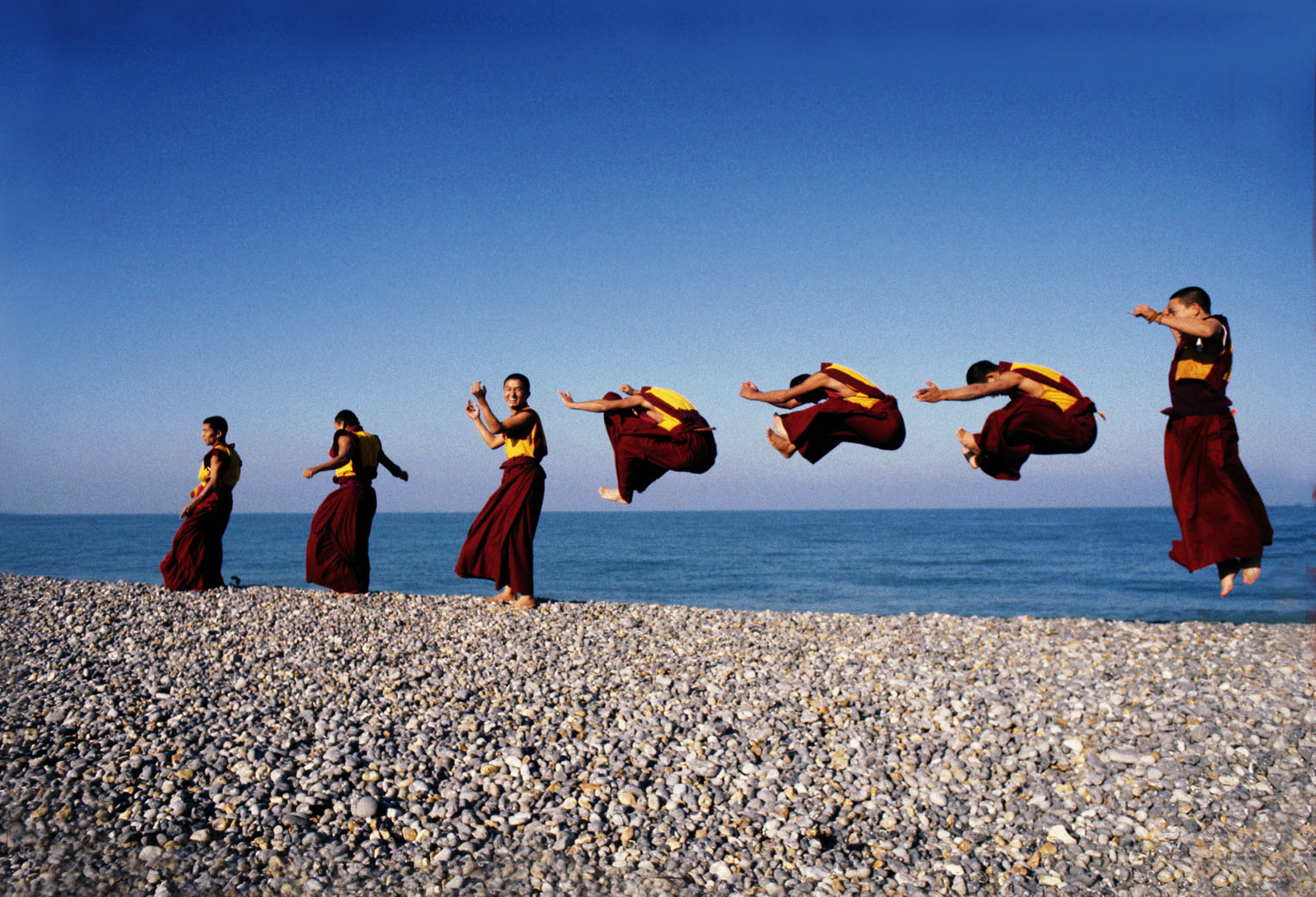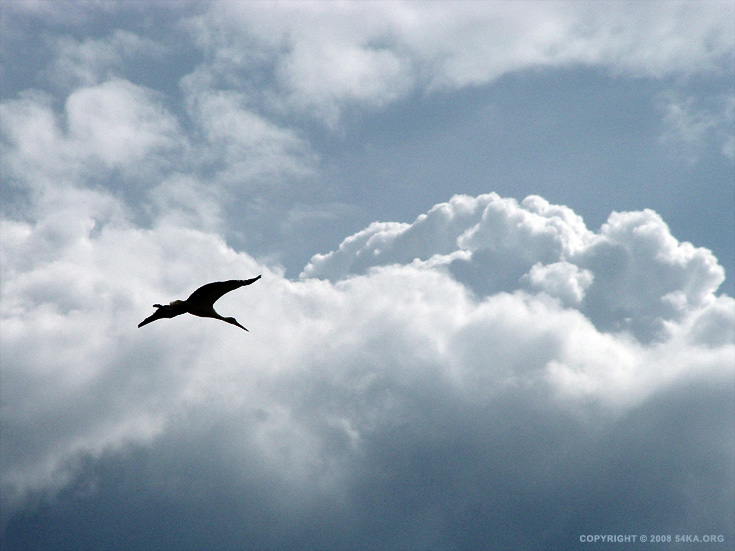The holidays can be a happy time, but often they become a difficult time. We may find that our ability to be present is compromised by super-charged emotions and busy minds. Hence, we miss the opportunity to fully appreciate a little time off from work and being close to loved ones.
The storylines that hold us back from being present grow strong at this time of year. Often those storylines are about disappointment. The holidays are a time of high expectation. You don't want to end up feeling like a kid who opened all of his presents and didn't get the thing he really wanted.
The "touch and go" technique, which I've blogged about before, is the perfect practice for the holidays. When your uncle is about to make a crazy political statement at dinner, or you're annoyed by
Sunday, December 23, 2012
Being Present for the Holidays
Labels: sangha retreat, shambhala, Sakyong
appreciation,
awareness,
christmas,
clarity,
Holidays,
practice,
touch and go
Sunday, December 9, 2012
The Buddha Was Not a Project Manager
For Buddhists, the Buddha is a model that provides inspiration. He walked the same path we walk and overcame many obstacles to attain enlightenment and free himself from the confusion that is samsara.
The historical Buddha left the gourmet food and dancing naked girls of his palace to work on freeing himself from suffering. He shopped around for different teachings and sat with many different teachers. Before he sat under the Bodhi Tree, where he attained enlightenment, he starved himself and probably did some terribly painful yoga poses.
In some ways we look at the Buddha as a model of hard work. After all, if you are going to pursue this path, it takes work. You don't just show up in front of a teacher and wait for him to waive a magic wand that frees you from suffering. You have to put in your own effort to
The historical Buddha left the gourmet food and dancing naked girls of his palace to work on freeing himself from suffering. He shopped around for different teachings and sat with many different teachers. Before he sat under the Bodhi Tree, where he attained enlightenment, he starved himself and probably did some terribly painful yoga poses.
In some ways we look at the Buddha as a model of hard work. After all, if you are going to pursue this path, it takes work. You don't just show up in front of a teacher and wait for him to waive a magic wand that frees you from suffering. You have to put in your own effort to
Labels: sangha retreat, shambhala, Sakyong
Buddha,
buddhism,
emotion,
hope and fear,
inspiration,
irritation,
letting go,
poverty mentality,
project,
refuge,
spiritual materialism,
suffering
Sunday, December 2, 2012
6 Ways to Create Space When Life is too Busy
When we get too busy our awareness is compromised. When relatives come to visit, or I'm trying to catch an airplane, or I just have a million things to do, my mind doesn't feel like an ally. Suddenly keys disappear, sunglasses hide on top of my head, important things go unnoticed.
Our minds are like one of those springs in the back of a wind up toy. Sure, winding up the spring makes you like a to-do-list destroying, 6-armed Energizer Bunny. Sometimes we need that to get things done, but the down-side is that winding the spring tightly means there is no space between our thoughts.
Our minds are like one of those springs in the back of a wind up toy. Sure, winding up the spring makes you like a to-do-list destroying, 6-armed Energizer Bunny. Sometimes we need that to get things done, but the down-side is that winding the spring tightly means there is no space between our thoughts.
Saturday, November 24, 2012
Punk's not Dead, It's just Getting Older
 Aging and rock n' roll don't go well together. When I listen to the music I love, especially old punk songs that nobody around me cares about anymore, I feel hopelessly doomed to a world where I keep getting older and the punk kids stay the same age.
Aging and rock n' roll don't go well together. When I listen to the music I love, especially old punk songs that nobody around me cares about anymore, I feel hopelessly doomed to a world where I keep getting older and the punk kids stay the same age.
Tonight Ted Leo, a DC punk hero, is playing an all ages benefit show and I'm dying to go. I don't hang out with many people that care anymore. My heart breaks to every drum beat. It wakes me up to every sprouting grey hair.
When I was about 20 years old I got free tickets to a Ramones show. I showed up with this girl and we laughed
Labels: sangha retreat, shambhala, Sakyong
aging,
ego,
egolessness,
experience,
identity,
krista tippet,
on being,
punk
Sunday, November 18, 2012
Three Steps to Unconditional Confidence
There are two kinds of confidence: the kind you pump up and the kind to which you wake up.
Conditional confidence comes from some kind of credential. If I read a book about cooking, I'm confident I know something about cooking. If I get a promotion at work, I have confidence that my colleagues see me a certain way. But if I get fired I might lose confidence in the way my colleagues see me.
Sometimes I'm walking down the street, totally wrapped up in my thoughts: "How can I be better at my job? Do people really like me?" Blah blah blah...
Labels: sangha retreat, shambhala, Sakyong
basic goodness,
confidence,
lungta,
shunyata,
technique
Sunday, November 11, 2012
Training Your Mind and Communicating Genuinely
 |
| Discipline: coming back to the practice. |
Our minds are kind of like big burly mastiffs. They are strong, energetic and often willful. If we don't train our minds, they'll pull us down the street in any direction they feel like going. It seems odd to think you can steer a course to happiness without training your mind first.
Training your mind requires exertion and discipline as a starting point. When your mind starts to run off,
Labels: sangha retreat, shambhala, Sakyong
Acharya,
awareness,
clarity,
communication,
dog,
emotion,
happiness,
how to,
letting go,
meditation,
practice,
Richard John,
sadness,
sakyong,
suffering,
Susan Piver
Monday, November 5, 2012
Where Courage is Born
A friend of mine told me a story in which his wife was pissed off. She let him have it with a list of grievances about the things he does wrong and how unhappy she is with their relationship. She couldn't keep her feelings bottled up anymore and wanted him to have a taste.
My friend suffered. It hurt to hear these things, but in this heated moment he experienced clarity. His ego shut off. His wife's words were like noise that didn't warrant a reaction. He noticed her heart and the suffering she radiated. It was like he allowed his brain to quit reacting so that their hearts could synchronize.
Labels: sangha retreat, shambhala, Sakyong
basic goodness,
brene brown,
clarity,
confidence,
courage,
fearlessness,
hope and fear,
letting go,
shame
Sunday, October 28, 2012
Mindfulness in a Middle Eastern Baklava Shop
 |
| Kunafah is crazy delicious! |
A highlight for me every time I go to the Middle East, is the food. In particular, I love baklava, especially when its made with gooey honey, sun cracked pistachios and golden brown phillo dough.
One day my wife and I walked into one of the ubiquitous sweets shops in Amman to find a man with a well groomed mustache ruling over his abundant world of perfumed, sugary, crispy, bite-sized culinary delights. He smiled at us when we walked in. I mangled a few words of Arabic, in an effort to learn more about what I was looking at. I asked him what you call the cheesy, golden pastry swimming in rose syrup.
Labels: sangha retreat, shambhala, Sakyong
amman,
appreciation,
awareness,
dignity,
happiness,
inspiration,
Islam,
Jordan,
Middle East,
self,
Shambhala,
travel
Sunday, October 21, 2012
100 Choices Every Second
In Western culture we have an incredible neurosis. We rarely feel worthy. We are never quite satisfied with who we are and where we are in life. This menace appears in our careers, where we never feel competent enough. It shows up at the gym, where we never feel fit enough. It shows up in school, where we never feel cool enough, popular enough, or smart enough. The shopping mall thrives on the fact that we are never satisfied, we can't just be happy.
There is probably someone in the world right now who is more satisfied than me, with less. I'm going to contemplate what makes that person tick.
I sometimes lose sight of what is in front of me at this moment and fantasize about where life might be taking me. I strategize about the future. Then I get frustrated because things aren't working out according to my 5 point program to become the super me.
There is probably someone in the world right now who is more satisfied than me, with less. I'm going to contemplate what makes that person tick.
I sometimes lose sight of what is in front of me at this moment and fantasize about where life might be taking me. I strategize about the future. Then I get frustrated because things aren't working out according to my 5 point program to become the super me.
Labels: sangha retreat, shambhala, Sakyong
choices,
contentment,
decisions,
happiness,
hope and fear,
interdependence,
karma,
mainstream,
resentment
Thursday, October 18, 2012
Guest Post: Six Weeks Ago
 This week I am excited to present a guest post from a dear DC Shambhala Sangha member, who also happens to be my meditation instructor. Jonathan Kirkendall offers a personal, moving and honest picture of impermanence, as he experienced when his partner suffered a stroke...
This week I am excited to present a guest post from a dear DC Shambhala Sangha member, who also happens to be my meditation instructor. Jonathan Kirkendall offers a personal, moving and honest picture of impermanence, as he experienced when his partner suffered a stroke...
When you go to a graduate school founded by a TibetanBuddhist master, where the writing department was developed by the Beat Poets,it is not surprising that the graffiti in the men’s room is poetic dharma. Written acrossthe metal stall all in caps in black magic marker, it reads:
ALL IS CHANGE
CHANGE IS ALL
I CAN REST IN NOTHING
I CAN REST IN NOTHING
I ran into this little piece of wisdom before classesstarted my first year there, and when I graduated three years later, I had it memorized. Of course, at graduate school all IS change. My long red hair morphed into a shaved headwhich became a red and gray buzz cut. Friends changed, classes changed, professors changed, mindschanged. And soon, Boulder, Colorado changed to New York City, which two years later changed to Washington DC.
Labels: sangha retreat, shambhala, Sakyong
family,
fear,
impermanence
Sunday, October 7, 2012
Guest Post: When the Floor Drops
Last week we had a guest post on having the rug pulled out from under you. This week I'm excited to present another guest post on impermanence from a friend and Sangha member. Wingy describes the painful experience of groundlessness after losing his job, his desire to escape, and then the inspiration gained from letting the situation be. Good thing Wingy started meditating or he'd just be another angry guy on the street!
I got fired. Well, I was asked to resign. Being “separated from the organization” is the clinical term. As with any time that the floor drops out from beneath you, it comes unexpectedly and leaves you spinning.
I got fired. Well, I was asked to resign. Being “separated from the organization” is the clinical term. As with any time that the floor drops out from beneath you, it comes unexpectedly and leaves you spinning.
This was 4 months ago. I had been meditating for about 1.5
years. You hear people talk about “groundlessness” and it all sounds pretty
good in theory. You let go, allow yourself to be present in the moment with
whatever arises, not clinging to habitual patterns or reference points. But nothing
teaches you groundlessness like the actual experience of not having any clue
what just happened or how you’re going to respond.
Labels: sangha retreat, shambhala, Sakyong
groundlessness,
impermanence,
Wingy,
work
Thursday, September 20, 2012
The Meditating Congressman
| Meditation: congressmen and kids do it |
The other night I went to hear Congressman Tim Ryan talk about his meditation practice, his new book called A Mindful Nation, and why mindfulness practice makes sense in American schools, our military, and just about every institution. It was empowering to see someone in the most quintessentially mainstream institution in America talking about mindfulness. It gave me hope that meditation is no longer just a fringe practice for punks and hippies to keep secret when they grow up and get real jobs.
Congressman Ryan pointed out that the Marines are studying and using meditation. Schools in his district of Youngstown and Warren, Ohio are using meditation and seeing test scores improve dramatically. Google and Proctor & Gamble teach it to employees. The Cleveland Clinic is using it with patients and seeing speedier recoveries. Even coach Phil Jackson of the LA Lakers and the Chicago Bulls has been teaching it to his players, so they can use it to get their minds in the game.
Labels: sangha retreat, shambhala, Sakyong
America,
Christianity,
congress,
Engaged Buddhism,
mainstream,
mindfulness,
politics,
Tim Ryan
Sunday, September 16, 2012
The Way in is the Way out
An old friend told me he felt like something was missing in his life. He talked about filling a void. He took a new job thinking that would solve it. But the void was still there. He talked about his lack of mindfulness, his habit of over-eating and the way he always feels like having the TV on to fill the silence.
I can relate to feeling like there is something missing. This is what led me to meditation. But what I've come to realize through the practice of meditation, is that this feeling of emptiness, which we might refer to as a void, is not the problem.
I can relate to feeling like there is something missing. This is what led me to meditation. But what I've come to realize through the practice of meditation, is that this feeling of emptiness, which we might refer to as a void, is not the problem.
Labels: sangha retreat, shambhala, Sakyong
awareness,
contentment,
courage,
Emptiness,
fear,
fearlessness,
loneliness,
loss,
mindfulness,
pema chodron,
rawness,
sadness,
shunyata,
void,
why meditate
Sunday, September 9, 2012
How Can I Meditate When the World Is Suffering?
 |
| How do we stop climate change? |
There is no strategy for ending homelessness or saving the world in Buddhism. There is no formula, no sense that you should do this, or not do that. There is no way you are supposed to feel.
Labels: sangha retreat, shambhala, Sakyong
activism,
awareness,
Engaged Buddhism,
interdependence,
practice,
suffering
Monday, September 3, 2012
Three Reasons I'm Still On the Path
After about 5 years of meditating like my life depended on it, I hit a wall. For the past two months, getting my butt on the cushion has been a struggle and a constant internal negotiation process. Summer felt good. Life felt good. Samsara didn't seem so bad. I started asking myself why was I meditating so much.
I realized I had done most of the things I originally wanted to achieve through meditation. I meditated for a whole month this spring, and that felt like an achievement. I've experienced more
I realized I had done most of the things I originally wanted to achieve through meditation. I meditated for a whole month this spring, and that felt like an achievement. I've experienced more
Labels: sangha retreat, shambhala, Sakyong
awareness,
experience,
fear,
gentleness,
inspiration,
letting go,
loneliness,
materialism,
meditation,
motivation,
pema chodron,
practice,
sadness,
Shambhala,
spiritual materialism,
technology,
why meditate
Monday, August 13, 2012
Samsara Doesn't Seem So Bad
When I was about 20 my dad took me on a kayaking trip to coincide with the whale migration off the coast of Baja California. I had a kayak with a rudder that I could steer. Every time I got off course, I'd make an adjustment to the rudder. Then I'd get off course the other way and I'd make another adjustment. Pretty soon I was zig zagging into the middle of the Gulf of California, trying to keep up with my dad who cruised along in a straight line, with half the exertion.
These days my meditation practice feels a bit like I felt on that kayak, trying to keep myself moving from point A to point B, but struggling. I just got back from 6 weeks working abroad, during which I cut back on my meditation practice to accommodate a busy schedule. I've returned home struggling to get back into my normal routine, finding my mind scattered and my inspiration lacking.
Labels: sangha retreat, shambhala, Sakyong
experience,
inspiration,
materialism,
meditation,
motivation,
samsara,
self
Sunday, July 29, 2012
Learning to Observe
It helps to think about why I spend so much time meditating. I ask myself this question at the beginning of every sitting. I come up with a different answer every day. Sometimes I want to slow my thoughts. Sometimes I want to be useful to people. Sometimes I want my mind to be as sharp as a sword.
But a question I ask myself less often is, "what is meditation for?" I just saw this video with Jetsun Khandro Rinpoche, where she offers a simple reminder that meditation is about becoming familiar with the mind and learning to observe the mind.
But a question I ask myself less often is, "what is meditation for?" I just saw this video with Jetsun Khandro Rinpoche, where she offers a simple reminder that meditation is about becoming familiar with the mind and learning to observe the mind.
Labels: sangha retreat, shambhala, Sakyong
awareness,
clarity,
experience,
gentleness,
Jetsun Khandro Rinpoche,
technique
Saturday, July 21, 2012
We All Want to Be Good Kings and Queens
At one point in the story, one of the Stark men feels lost. He doesn't know whether to march his army north or south. He is being pulled in different directions, not knowing whose counsel to listen to, not knowing whom he can trust. When a young maiden shows him kindness, he lets out his frustration. Then he apologizes. He says, "that's not the kind of king I want to be." When the maiden asks what kind of king he would like to be, he says, "I don't know... the good kind."
Labels: sangha retreat, shambhala, Sakyong
aggression,
bravery,
confidence,
courage,
Engaged Buddhism,
fear,
fearlessness,
Game of Thrones,
king,
queen,
responsibility,
rigden,
rulership,
ruling,
Shambhala,
warriorship,
work
Sunday, July 8, 2012
How I became a Buddhist Evangelist and then Gave up
Before I became a Buddhist, I had a good life: beautiful girlfriend, lots of friends, money to burn, interesting career... but even rockstars, who are supposed to have it all, often feel a profound sense of emptiness. I was no rockstar, but something was missing.

Years before, I backpacked around Asia. I visited monasteries in the high Himalayas. These places felt like they were trapped in time. Bells and drums punctuated mysterious chants. Massive horns blasted the spirit of awakened heart into the heavens and into my guts. The clash of cymbals a midst the thick smoke of burning juniper grabbed my attention and shook me by the collar. I could have been Marco Polo in a scene of unprecedented cross-cultural encounter (if it wasn't for those Euro hikers in neon jackets, sitting behind the red-robed monks).

Years before, I backpacked around Asia. I visited monasteries in the high Himalayas. These places felt like they were trapped in time. Bells and drums punctuated mysterious chants. Massive horns blasted the spirit of awakened heart into the heavens and into my guts. The clash of cymbals a midst the thick smoke of burning juniper grabbed my attention and shook me by the collar. I could have been Marco Polo in a scene of unprecedented cross-cultural encounter (if it wasn't for those Euro hikers in neon jackets, sitting behind the red-robed monks).
Labels: sangha retreat, shambhala, Sakyong
beginners,
buddhism,
communication,
ego,
egolessness,
evangelism,
experience,
friendship,
happiness,
inspiration,
mistakes,
relationships,
religion,
spiritual materialism,
why meditate
Location: Shambhala Mountain Center, Colorado, USA
Kiev, Kyiv city, Ukraine, 02000
Monday, June 25, 2012
How to Be a Coward
I got snippy with a guy the other day. I could see the surprise on this face, so I realized I needed to turn down the volume. I felt a bit embarrassed and he felt a bit hurt. We went on with our conversation, pretending like nothing happened.
After the conversation I left, and then I thought, "wow, where did that come from? When did I become such an asshole?" I was uncomfortable. I could feel it in my chest. There was a battle going on inside my head, but I decided I had a lot to do, so I pushed the thoughts and discomfort away. It's easy to keep painful or disturbing thoughts away by finding other ways to distract your mind. That's how people with families become workaholics.
After the conversation I left, and then I thought, "wow, where did that come from? When did I become such an asshole?" I was uncomfortable. I could feel it in my chest. There was a battle going on inside my head, but I decided I had a lot to do, so I pushed the thoughts and discomfort away. It's easy to keep painful or disturbing thoughts away by finding other ways to distract your mind. That's how people with families become workaholics.
Labels: sangha retreat, shambhala, Sakyong
bravery,
coward,
experience,
fear,
fearlessness,
work
Sunday, June 17, 2012
Experiencing Pain
 Life is beautiful and full of pain. When we feel something painful in our hearts, our instinct is to escape. We can be like little kids, seeing a bee and running away in terror. But we could aspire to be more steady than that, a little more courageous.
Life is beautiful and full of pain. When we feel something painful in our hearts, our instinct is to escape. We can be like little kids, seeing a bee and running away in terror. But we could aspire to be more steady than that, a little more courageous.When I was on retreat in April, I took a hike up to the purkhang where Chogyam Trungpa was cremated. It's in a grassy meadow, surrounded by pine forests and mountains on three sides that reach straight up to the clouds.
I was looking at the purkhang, taking in the space, when another woman on retreat, who was circumambulating the purkhang, suddenly broke out into tears. I knew what was on her mind because she told me one of her closest friends was dying.
Labels: sangha retreat, shambhala, Sakyong
bravery,
Chogyam Trungpa,
fear,
fearlessness,
rawness,
suffering,
warriorship
Sunday, June 3, 2012
Applying Tonglen in Everyday Life
Here's a suggestion: next time you are really really pissed off or irritated or whatever, notice that. If you do notice it, you are 50% of the way to letting it go. Maybe more than 50%.
Today I was in an argument with the woman I love and live with. I was completely hooked. I was mad because she was mad and she was mad because I was mad that she was mad. She wouldn't talk about it or say she was mad, so that made me feel more neurotic, more mad.
A proverbial devil on my shoulder was saying, "your problems are nonsense. Girls in Calcutta are being forced into slavery; climate change is melting the Poles. You're pathetic!" On the other shoulder an angel was saying, "it's OK. You can't control your thoughts. Don't fight them. Accept them and let go." In fact, both voices were right, but that wasn't helping me get over the feeling.
Today I was in an argument with the woman I love and live with. I was completely hooked. I was mad because she was mad and she was mad because I was mad that she was mad. She wouldn't talk about it or say she was mad, so that made me feel more neurotic, more mad.
A proverbial devil on my shoulder was saying, "your problems are nonsense. Girls in Calcutta are being forced into slavery; climate change is melting the Poles. You're pathetic!" On the other shoulder an angel was saying, "it's OK. You can't control your thoughts. Don't fight them. Accept them and let go." In fact, both voices were right, but that wasn't helping me get over the feeling.
Labels: sangha retreat, shambhala, Sakyong
anger,
pema chodron,
resentment,
tonglen
Sunday, May 27, 2012
How to Dissolve Resentment
It's easy to get fixated on resentment in life. We resent not being loved; we resent snarky remarks; we resent our talents going unnoticed; we resent prejudice; we resent not being perfect. But resentment is the ground for us to work from, when we realize that resentment is a cowardly and ineffective attempt to avoid pain.
To be clear, I'm not talking about anger or saying we shouldn't be angry sometimes. When we see people being oppressed, anger seems the appropriate response. What I'm talking about is petty resentment, which often leads us to talk a lot of smack in the face of something we interpret as a personal affront.
It takes courage to work with our resentment, and it takes a mind that is aware of the object of resentment, our fear and the impulse to escape from it. At the bottom of resentment is pain and we need the courage to run straight into that pain. The way in is the way out.
To be clear, I'm not talking about anger or saying we shouldn't be angry sometimes. When we see people being oppressed, anger seems the appropriate response. What I'm talking about is petty resentment, which often leads us to talk a lot of smack in the face of something we interpret as a personal affront.
It takes courage to work with our resentment, and it takes a mind that is aware of the object of resentment, our fear and the impulse to escape from it. At the bottom of resentment is pain and we need the courage to run straight into that pain. The way in is the way out.
Labels: sangha retreat, shambhala, Sakyong
aggression,
anger,
awareness,
bravery,
buddhism,
Chogyam Trungpa,
complain,
confidence,
courage,
egolessness,
fear,
fearlessness,
how to,
pema chodron,
resentment,
tonglen
Monday, May 21, 2012
Five Ideas for Practicing Mindfulness in Daily Life
Sakyong Mipham Rinpoche has said that true confidence is synchronization of mind and body. This rings true for me, based on experience. I recently came away from a dathun (4 week meditation and mindfulness retreat), and when people ask me how the experience made me feel, the best answer I could give them was, "confident." That might sound odd at first, but confidence most accurately describes the way I feel when I focus all of my energy on one thing at a time. When I can totally focus my mind, I'm not such a pushover. I feel unshakeable.
During dathun our teacher shared ideas about how to bring mindfulness into our daily lives, and I've continued to ponder this. This list includes some of my own ideas, but also borrows from Cara Thornley, who led the dathun I attended, and from Ani Pema Chodron.
During dathun our teacher shared ideas about how to bring mindfulness into our daily lives, and I've continued to ponder this. This list includes some of my own ideas, but also borrows from Cara Thornley, who led the dathun I attended, and from Ani Pema Chodron.
Labels: sangha retreat, shambhala, Sakyong
dathun,
Facebook,
mindfulness,
pema chodron,
sakyong,
senses,
technology
Monday, May 14, 2012
Putting a Rock on a Leaf: 4 Steps to Beginning a Meditation Session
 In Turning the Mind into an Ally, Sakyong Mipham Rinpoche describes the act of starting your meditation session with intention. He says it is, "like putting a rock on a leaf." It's really helpful for me to conjure this image whenever I'm starting my sitting meditation practice. It is firm and gentle at the same time, the way you would tell a child not to pull a dog's tail. This is exactly the type of mindset one needs to cultivate in meditation.
In Turning the Mind into an Ally, Sakyong Mipham Rinpoche describes the act of starting your meditation session with intention. He says it is, "like putting a rock on a leaf." It's really helpful for me to conjure this image whenever I'm starting my sitting meditation practice. It is firm and gentle at the same time, the way you would tell a child not to pull a dog's tail. This is exactly the type of mindset one needs to cultivate in meditation.Making sure that your practice starts out right from the first few seconds of a sitting session has a strong effect on the rest of your meditation. Lately, I've paired the image of the rock on a leaf with several steps to make sure the rock is firmly on the leaf. It helps ensure that my mind isn't blown away by thoughts, at least not right at the beginning of a session (that can happen!).
Sunday, May 6, 2012
Three Things I Learned at Dathun
 I learned a whole lot of things at the mostly silent 28 day meditation retreat called dathun, from which I just returned. I learned that Mahakala (the fearsome Tibetan protector deity known for severing the heads of those who pervert the Dharma) loves his daily shrine offering of Cheerios. Sometimes he gets Rice Crispies too. I learned that eating all of your meals in the Zen Oryoki style can take a few inches off your muffin-top; and little screw-ups during Oryoki can leave a room full of people helplessly giggling. In a dathun you can totally mess with people by putting terrible songs into their heads. I also learned that getting to know people without talking to them is an amazing way to notice things about how your mind works. But of all the things I learned, there are three big ones that I wanted to share with you, so here goes...
I learned a whole lot of things at the mostly silent 28 day meditation retreat called dathun, from which I just returned. I learned that Mahakala (the fearsome Tibetan protector deity known for severing the heads of those who pervert the Dharma) loves his daily shrine offering of Cheerios. Sometimes he gets Rice Crispies too. I learned that eating all of your meals in the Zen Oryoki style can take a few inches off your muffin-top; and little screw-ups during Oryoki can leave a room full of people helplessly giggling. In a dathun you can totally mess with people by putting terrible songs into their heads. I also learned that getting to know people without talking to them is an amazing way to notice things about how your mind works. But of all the things I learned, there are three big ones that I wanted to share with you, so here goes...
Labels: sangha retreat, shambhala, Sakyong
awareness,
Chogyam Trungpa,
dathun,
experience,
gentleness,
inspiration,
meditation,
mindfulness,
oryoki,
retreat,
sakyong,
shamatha,
vipashyana,
zen
Wednesday, April 4, 2012
Going on Dathun
I won't be online for a few weeks because I am going on a dathun, which is a month-long meditation retreat. I'll be waking up at 6:30am and then meditating for most of the day, with periods for meals, chores and hearing teachings and instructions.
According to the Shambhala website:
Dathün (Tibetan for "month session") is a one-month group meditation retreat lead by a senior teacher. It is open to anyone and is a very powerful introduction and deepening of mindfulness-awareness meditation... Silence and functional talking are observed throughout the day. Meals are served in the shrine room oryoki-style, a practice of mindful eating taken from the Zen tradition. There is regular individual instruction with trained meditation instructors.
This is something I've been planning for and looking forward to for years. I'm not sure I know what to expect. I'm kind of in it to go along for the ride, which I've found is a good way to approach things like this.
According to the Shambhala website:
Dathün (Tibetan for "month session") is a one-month group meditation retreat lead by a senior teacher. It is open to anyone and is a very powerful introduction and deepening of mindfulness-awareness meditation... Silence and functional talking are observed throughout the day. Meals are served in the shrine room oryoki-style, a practice of mindful eating taken from the Zen tradition. There is regular individual instruction with trained meditation instructors.
This is something I've been planning for and looking forward to for years. I'm not sure I know what to expect. I'm kind of in it to go along for the ride, which I've found is a good way to approach things like this.
Sunday, March 25, 2012
Engaged Buddhism: Working with Aggression
 |
| Thic Quang Duc set himself on fire in 1963 to protest the persecution of monks in Vietnam. |
But I have to admit that when I started researching it, I might have been disappointed to learn that engaged Buddhism is not all about standing up to The Man. Engaged Buddhism is not an excuse to use aggression for the forces of "good." Engaged Buddhism is the practice of working with aggression in the world.
Labels: sangha retreat, shambhala, Sakyong
activism,
aggression,
anger,
buddhism,
Chogyam Trungpa,
Dalai Lama,
Engaged Buddhism,
gentleness,
kleshas,
letting go,
peace,
pema chodron,
religion,
thic nhat hanh,
warriorship
Sunday, March 18, 2012
Complaining Complainers Who Complain
Chogyam Trungpa said that irritation is the vanguard of basic goodness, or so I've heard from some of his students. In standard English, this means that when you find yourself irritable, you should stick with the feeling and not try to escape it by badmouthing your situation. If you you can be present with the raw feeling, without stories and justifications, you may be rewarded with an experience of the mind and the heart opening. You might see something beautiful... human... maybe even sacred.
I've had this experience a few times, where I'm walking down the street, trying to shake a negative emotion, hearing the story in my mind, and then something wakes me up. I see the bigger picture all of a sudden. Sometimes I have to laugh. Other times, I just shake my head in wonder. Unfortunately, there are many more times when I don't wake up and the negative emotion leads to complaints, stories, unnecessary conflicts.
We all get irritated and we all complain. We complain about traffic, about work, about our friends, about our lack of a friends... it seems like there is always something to complain about, even if it never solves anything.
I've had this experience a few times, where I'm walking down the street, trying to shake a negative emotion, hearing the story in my mind, and then something wakes me up. I see the bigger picture all of a sudden. Sometimes I have to laugh. Other times, I just shake my head in wonder. Unfortunately, there are many more times when I don't wake up and the negative emotion leads to complaints, stories, unnecessary conflicts.
We all get irritated and we all complain. We complain about traffic, about work, about our friends, about our lack of a friends... it seems like there is always something to complain about, even if it never solves anything.
Labels: sangha retreat, shambhala, Sakyong
awareness,
basic goodness,
Chogyam Trungpa,
complain,
contentment,
emotion,
irritation,
rawness
Sunday, March 11, 2012
Wax on Wax off
The other night I attended a talk with Lodro Rinzler, who was in DC on a tour for his new book, The Buddha Walks into a Bar. I was selling books while he signed copies and a woman came up to him and told him what a hard time she was having with her health and her family. She asked, "does it get easier?" He looked at her in a way that I knew he was listening with an open heart. "Yes, I think it does," he said.
I often think of meditation practice as a "two steps forward, one step back" situation. If we set our minds to it, we can develop a fulfilling practice with great discipline. This discipline can extend out to the rest of our lives so that we gain real insights and feel we are on the right track. Then something happens: we get hooked by our emotions, we lose our tempers, someone offends us, our sense of openness closes down and we want to tear our heart out and stomp on it…. or as I like to say, "the fit hits the shan."
Labels: sangha retreat, shambhala, Sakyong
experience,
fearlessness,
gentleness,
hope and fear,
pema chodron,
practice
Sunday, March 4, 2012
6 Ways to Approach Lust and Monogamy
Jeff Bridges (who is a Buddhist and a big fan of Chogyam Trungpa) did an interview with Tricycle Magazine in 2010. He described how he develops intimacy with the actors he works with, which leads to convincing performances. He discussed how his wife allows him to develop these deep relationships and how there is no sex involved, because then it would just get weird.
This interests me because I've often had a sad feeling about being in a relationship, since it seems like you aren't supposed to be curious about or attracted to anyone other than your current partner. Inevitably, I have been curious, and often this feeling made me feel like I needed to put a leash on myself and nip the whole thing in the bud.
This interests me because I've often had a sad feeling about being in a relationship, since it seems like you aren't supposed to be curious about or attracted to anyone other than your current partner. Inevitably, I have been curious, and often this feeling made me feel like I needed to put a leash on myself and nip the whole thing in the bud.
Labels: sangha retreat, shambhala, Sakyong
appreciation,
awareness,
buddhism,
experience,
fear,
fearlessness,
gentleness,
happiness,
hope and fear,
meditation,
relationships,
self,
suffering,
tonglen,
why meditate
Monday, February 27, 2012
Touching Basic Goodness
 There is goodness that you feel conditionally: scoring a goal in a soccer game, acing an exam, finishing a hard workout, stopping the invasion of planet earth by a hostile alien race... All of that stuff feels good, no question, but only if we succeed.
There is goodness that you feel conditionally: scoring a goal in a soccer game, acing an exam, finishing a hard workout, stopping the invasion of planet earth by a hostile alien race... All of that stuff feels good, no question, but only if we succeed.
There is another kind of goodness that is unconditional. You can learn to feel it even without an accomplishment to get the party started.
Labels: sangha retreat, shambhala, Sakyong
basic goodness,
buddhism,
shunyata,
Trungpa
Monday, February 20, 2012
Minding the Gap and Getting out of Samsara
Tibetan Buddhism's examination of karma includes a series of causes and linkages called the 12 Nidanas. The cycle of confusion that keeps humans in a perpetual state of suffering called samsara is a result of the Nidanas. These are depicted through the 12 images around the outside of the wheel of life.
Starting to the right of 12 o'clock, the images include:
1. blind old woman (ignorance),
2. potter making a pot (formation),
3. monkey in a tree (consciousness),
4. three men in a boat (name and form),
Labels: sangha retreat, shambhala, Sakyong
buddhism,
cause,
groundlessness,
interdependence,
karma,
nidanas,
pema chodron,
relationships,
samsara,
self,
suffering,
wheel of life
Location: Shambhala Mountain Center, Colorado, USA
Kiev, Kyiv city, Ukraine, 02000
Monday, February 13, 2012
The 8 Forms of Suffering
 |
| Charles Bukowski, not a meditator. |
Tully: You can really write. Why do you live like a bum?
Henry (who is basically Bukowski): I am a bum. What do you want me to do? Do you want me to write about the sufferings of the upper classes?
Tully: This may be news to you but they suffer too.
Henry: Hey baby, nobody suffers like the poor.
That last phrase has stuck with me for years. Throughout my time in the Peace Corps, in my work in international development and humanitarian relief, and as a Buddhist, I've often wondered if the poor suffer more. I used to think they definitely did, although I have seen some very well adjusted poor people and I have seen lots of miserable rich people. The poor obviously suffer more in the material sense. Those who live in constant fear of violence may suffer even more than those who are just poor.
Labels: sangha retreat, shambhala, Sakyong
art,
basic goodness,
buddhism,
cause,
experience,
four noble truths,
self,
suffering,
Trungpa
Location: Shambhala Mountain Center, Colorado, USA
Hanoi, Hoàn Kiếm, Hanoi, Vietnam
Monday, February 6, 2012
Thoughts are Contagious
You're thoughts are contagious, especially when you vocalize them. Positive thoughts, or negative thoughts, whether it's in the places we live, work, study, practice or gather, when you give voice to your thoughts, they can spread like fire.
A few complaints can create a palor of unsettled discontent in your environment. They can taint the way your friends and family see the world.
The Aikido dojo where I practice has a rule. Students of this Zen influenced martial art shouldn't vocalize their emotional baggage in the dojo. If someone in the locker room starts complaining about his boss, the next guy is likely to join in with a similar story. Next thing you know, 3 people will be complaining about their workplace and a cloud of dissatisfaction settles in. This leaves us in a poisonous place that isn't conducive to practice and study.
Labels: sangha retreat, shambhala, Sakyong
awareness,
beginners,
egolessness,
environment,
experience,
family,
generosity,
gentleness,
mindfulness,
practice,
self,
work
Location: Shambhala Mountain Center, Colorado, USA
Hanoi, Hoàn Kiếm, Hanoi, Vietnam
Sunday, January 29, 2012
Practicing Happiness

One thing I have heard a few times on Krista Tippet's show on NPR called On Being is that happiness is a practice. This idea inspires me and me gives me hope that we can all be happy. It also highlights the fact that our society is confused about how we achieve happiness. We are silly to think we can find happiness without practicing it, as if you could get in shape without exercising.
His Holiness the Dalai Lama says that all beings want to be happy and that this is good. However, there is some confusion in our society about whether the pursuit of happiness is indeed a noble thing. Some of the confusion stems from the notion that seeking happiness for yourself is selfish. Once we get past this hang-up, we often encounter even greater confusion about how to seek happiness.
In this blog post I want to throw out a few ideas about what practicing happiness might look like.
Labels: sangha retreat, shambhala, Sakyong
appreciation,
Dalai Lama,
egolessness,
Ethan Nichtern,
generosity,
gentleness,
happiness,
interdependence,
krista tippet,
on being,
practice,
religion,
tonglen
Sunday, January 22, 2012
Meditator Gets Hoodwinked by Religion
 I recently tried to set up an introduction to meditation during lunch hour at my work. I found myself contemplating how religion and meditation are related because I had to assure people that this was not a religious thing. Of course, there doesn't have to be anything religious about meditation, but people tend to worry that they are about to get hoodwinked.
I recently tried to set up an introduction to meditation during lunch hour at my work. I found myself contemplating how religion and meditation are related because I had to assure people that this was not a religious thing. Of course, there doesn't have to be anything religious about meditation, but people tend to worry that they are about to get hoodwinked.At the end of the day, all forms of meditation have origins in the world's wisdom traditions or religions. If you haven't signed up for membership in one of the world's religions, don't worry! You don't have to join a religion to get something out of meditation, but allow me to expound on the relationship I see between meditation and religion.
Labels: sangha retreat, shambhala, Sakyong
attachment,
beginners,
buddhism,
Christianity,
communication,
egolessness,
Islam,
meditation,
religion,
science,
self,
sufi,
yoga
Thursday, January 19, 2012
The 8th Level of Consciousness
The 8th level of consciousness is something that exists before thoughts. It is the sense of "being" before the thoughts and interpretations come in. It is the level at which we experience alaya or basic goodness. This is "alaya," which means "abode" as in "Him-ALAYA," the abode of snow; so alaya
is referred to like a home base in the mind, free from discursive thought.
Labels: sangha retreat, shambhala, Sakyong
Alaya,
basic goodness,
buddhism,
meditation,
nature,
technique
Sunday, January 15, 2012
Are Thoughts Just Mental Panic Attacks?
I was wondering where my mental storylines come from, which in effect is asking the same question as, "where do my thoughts come from?"
When I get into an argument with my partner, which is then followed by a lot of storytelling in my mind, I wonder who or what is making up those stories. Is it a soul? That seem ridiculous! So who the hell, what the hell, is making up all of those stories?
Labels: sangha retreat, shambhala, Sakyong
attachment,
awareness,
cause,
clinging,
experience,
groundlessness,
hope and fear,
meditation,
mindfulness,
pema chodron,
samsara,
self,
shunyata,
technique,
vipashyana
Tuesday, January 10, 2012
Mind Like Sail, Thoughts Like Wind

While the fruition of meditation is not something to be measured, it can be helpful to look back and see how far you've come.
Learning to meditate is like becoming the skipper of a sailboat. The boat represents your life. The hull is like your body that allows you to move around and do things. The winds are like your thoughts that fill the sails of your mind and push you from one destination or scenario to the next.
Labels: sangha retreat, shambhala, Sakyong
awareness,
communication,
experience,
letting go,
meditation,
mindfulness,
relationships,
shamatha,
technique,
why meditate
Friday, January 6, 2012
Guest Post: Fearlessness through Fear
 I had always been fine flying until one particular flight in August of 2010. I was going to Tanzania to give some presentations and expected it to be a difficult trip, my first time to Africa, hostile audience (people who weren't happy with the strategy my team was developing), you get the idea. I boarded the plane and sat down my seat in the very back row. All of a sudden, I just began to feel trapped, like I couldn't breathe, hot, legs shaking, and panicked.
I had always been fine flying until one particular flight in August of 2010. I was going to Tanzania to give some presentations and expected it to be a difficult trip, my first time to Africa, hostile audience (people who weren't happy with the strategy my team was developing), you get the idea. I boarded the plane and sat down my seat in the very back row. All of a sudden, I just began to feel trapped, like I couldn't breathe, hot, legs shaking, and panicked.
Labels: sangha retreat, shambhala, Sakyong
awareness,
emotion,
experience,
fear,
fearlessness,
gentleness,
why meditate,
Wingy
Wednesday, January 4, 2012
4 Buddhist Ways to Loosen the Bully's Grip
The behavior of the bullies you confront will change as you get older, but at any age, a bully is someone who tries to break your spirit. Bullies pump themselves up by teasing or terrorizing others, exposing the painful fact that their victims are weaker. They may lock kids in the wood-shop tool shed (my own personal experience), steal lunch money, or continuously undermine their co-workers to make themselves look more important or competent.
Labels: sangha retreat, shambhala, Sakyong
aggression,
Bruce Lee,
bully,
confidence,
experience,
fear,
fearlessness,
happiness,
interdependence,
meditation,
pema chodron,
practice,
samurai,
Shambhala,
suffering,
Trungpa,
warriorship,
zen
Sunday, January 1, 2012
Clinging to Hope and Fear
 In the second of the Four Noble Truths, the Buddha taught that clinging or attachment is the root of suffering. On Christmas Eve I was reminded of this.
In the second of the Four Noble Truths, the Buddha taught that clinging or attachment is the root of suffering. On Christmas Eve I was reminded of this.
My wife and I had plans to go over to a close friend's house for Christmas Eve dinner. I was extra excited because usually DC empties out for Christmas and we have no friends around. Christmas eve has seemed kind of lonely over the past few years, but this year would be different.
I eagerly planned out the side dish I would make for the occasion. Then, just as I was about to go out and buy a bottle of wine and the ingredients for my side dish, I got a phone call from my friend.
Labels: sangha retreat, shambhala, Sakyong
attachment,
awareness,
buddhism,
clinging,
experience,
fear,
four noble truths,
hope and fear,
hungry ghost,
letting go,
preta
Subscribe to:
Comments (Atom)
























